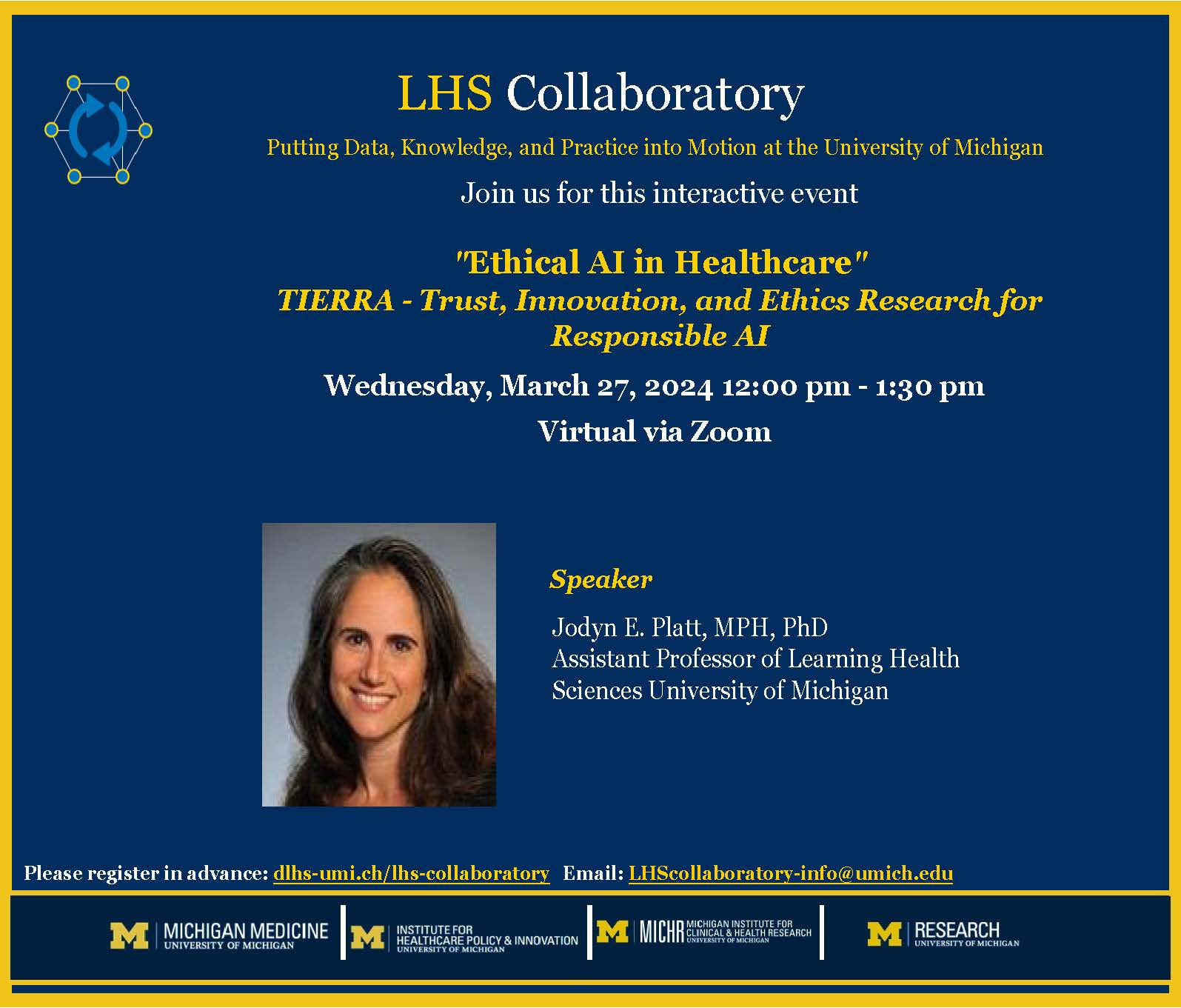Below are links to the archives of all the LHS Collaboratory's previous events ranging from 2016 to the current academic year.
2023-2024 Collaboratory Archive
LHS Collaboratory March Session
Wednesday, March 27, 2024
“Ethical AI in Healthcare"
TIERRA - Trust, Innovation, and Ethics Research for Responsible AI
Speaker: Jodyn E. Platt, MPH, PhD
View Dr. Platt's presentation slides here.
View Chat comments here.
View the session recording here.
LHS Collaboratory Special Workshop
Friday, March 15, 2024
"Co-Designing Translation: Using Implementation Science and Community Engagement to Reduce the Research-to-Practice Gap"
Implementation science and community engagement are essential to the co-design of optimal treatments to improve population health outcomes and equity. This workshop, co-led by MICHR and the Department of Learning Health Sciences will feature Drs. Gretchen Piatt and Susan Murphy, who will present work on engaging community partners in implementation research, and how a learning health system framework can facilitate this process. The workshop will also feature brainstorming sessions on co-designing implementation research projects across different community-based settings which will feature practical tools on how to use implementation science, learning health system framework, and community engagement methods to promote the more rapid translation of effective treatments in community settings.
"Introduction to Implementation Science"
Speaker: Gretchen A. Piatt, MPH, PhD
View Dr. Piatt's presentation slides here.
“Enhancing research translation into the real-world: Pairing implementation science and community engagement”
Speakers:
Alexandra Harper, PhD, OTR/L, CPHQ
View Dr. Murphy's and Dr. Harper's presentation slides here.
Brainstorm Breakout Room 1: "Maternal Health in Ghana"
Brainstorm Breakout Room 2: "Implementing Physical Activity Interventions in Schools"
Brainstorm Breakout Room 3: "Implementing Evidence-Based Diabetes Self-Management Solutions"
View the session recording here.
LHS Collaboratory January Session
Tuesday, January 16, 2024
“Preparing Clinicians for Artificial Intelligence in Health Care"
Speaker:
Clinical Assistant Professor
Department of Internal Medicine, University of Michigan
View the session recording here.
View the presentation slides here.
LHS Collaboratory December Session
Tuesday, December 12, 2023
“Creating Informatics-Enabled Learning Health Systems: Now it's Personal!"
Speaker:
Peter J. Embi, MD, MS, FACP, FACMI, FAMIA, FIAHSI
Professor and Chair, Department of Biomedical Informatics
Senior Vice President for Research and Innovation, Professor of Medicine, Vanderbilt University
View the session recording here.
LHS Collaboratory November Session
Tuesday, November 21, 2023
“Learning Without Borders: AI's Dual Path in Veterans and Global Health”
Speaker:
LHS Collaboratory October Session
Wednesday, October 18, 2023
"Putting Artificial Intelligence and Machine Learning into Practice: Trustworthiness of Predictions for Individual Patients"
Speaker:
Ewout W. Steyerberg, PhD
Professor of Clinical Biostatistics & Medical Decision Making, Chair, Dept of Biomedical Data Sciences
Leiden University Medical Center, The Netherlands
View Professor Steyerberg's presentation slides here.
Kickoff Poster Session
Wednesday, September 27, 2023
List of Poster Titles and Author Information
Links to posters
Concussion Learning Health System (C-LHS): Lessons Learned and a Path Forward
Personalized Automated Intelligent Management (PAIM) System for Chronic Pain
Precision Feedback for Learning Health Systems
The Knowledge Systems Lab: Advancing the Science and Management of Computable Knowledge
Cultivating Infrastructure: Building the Bipolar Disorder Learning Community
Enhancing Researcher Value: Connecting with MICHR’s Network-Based Research Unit (NBRU)
HeartSafe Home - Plan and Practice for Out-of-Hospital Cardiac Arrest
EMERSE Text Processing Tool for Clinical Documents
Precision Health at the University of Michigan: From Data to Implementation
DeiDoc: Automatic De-identification of Notes Using Long-document Transformers
LHS712EE at BioLaySumm 2023: Using BART and LED to Summarize Biomedical Research Articles
Journal of Learning Health Systems: A Novel Journal for a Transdisciplinary Science


